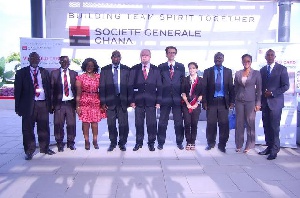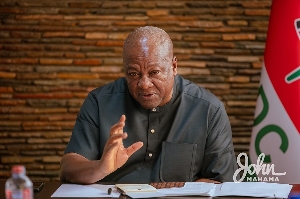Business News of Tuesday, 4 August 2015
Source: B&FT
Market should lead consolidation – Banker
Consolidation of the growing number of the universal banks in the country must be driven by market forces rather than engineered by the central bank, Francois Marchal, Deputy Managing Director of Societe Generale Ghana, has said.
“If there is a bank that is not able to serve and protect its depositors, then the process can get started. But I believe it should be a market process driven by market forces wherein banks see opportunities to consolidate rather than a rule to limit so many banks in Ghana.”
There are about 28 universal banks with a total paid up capital of GH¢2.72billion as at March 2015 and total assets of GH¢55billion. Stakeholders in the banking sector have interrogated proposals by experts calling for the consolidation of banks in the country through acquisitions and mergers.
The sticking points have been whether there should be any such attempt and if it should be engineered by the regulator, the bank of Ghana, by raising the minimum capital requirement or encouraged by the use of incentives.
In addition to the commercial banks, there are about 35 savings and loans companies and over 300 microfinance intuitions in the country providing financial services to the just-under 30 percent of the 26.5 million population that is within the formal banking sector.
With a minimum paid up capital of GH¢120million per universal bank, banking analysts have said the banks are not large enough to undertake big-ticket transactions and that consolidation is needed to create banks with the financial strength to accelerate growth of the economy.
He said: “The competition is very strong in Ghana and I think it’s good for the market. I believe in competition, because in the end it benefits the customer. But we need to strike a balance between competition and banking stability. As long as the market is sound enough and there is space for everyone, there is no need to have bigger banks as long as the existing ones are able to match the needs of the clients.
“When the banks stop financing the economy, which is not the case currently as the distribution of credit has been growing tremendously, then it might be a question; but for now there is no bank that is not able to serve the clients.”
Fidelity Bank Ghana Limited recently acquired 100 percent ownership of ProCredit Savings and Loans Company Limited as part of a strategy to leverage the latter’s’ strong SME presence and processes.
While banks are stoical over engineered mergers and acquisition, they believe that there needs to be some sort of growth in the banking sector in terms of deposits that will be triggered by growth in economic activity, which will naturally see banks grow and have resources to be able to take on big size transactions.
The economy is currently going through a challenging phase. Following a period of high and sustained growth, the economy experienced considerable turbulence reflected in high twin deficits and low growth.
Twin deficits exceeded 10% of GDP, and economic growth collapsed to 4% last year after reaching 14% in 2012.
The country was hit by a series of external and domestic shocks which have shaken its economic fundamentals.
Consequently, international reserves dwindled, the cedi depreciated, public debt rose quickly, and interest rates rose sharply. Policy uncertainty prevailed and real economic growth slumped.
A major obstacle to the restoration of macroeconomic stability in Ghana is the level and composition of government debt: total debt had risen to 65% of GDP at the end of 2014 and amortisations have almost doubled from what they were two years ago.
It is envisaged that the three-year International Monetary Fund (IMF) programme will restore the economy back on track, though the promised fiscal disciplined has been questioned going into general and presidential elections in 2016.











